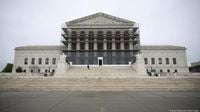The U.S. Supreme Court has temporarily blocked the Trump administration's efforts to deport Venezuelan migrants from detention centers, following reports that some were being prepared for deportation without proper legal recourse. This decision comes amid concerns that the administration was invoking the Alien Enemies Act of 1798, a law traditionally used during wartime, to justify the deportations.
On Saturday, April 19, 2025, the Supreme Court issued a ruling stating that the government was prohibited from deporting any individuals from this specific group of detainees until further notice. The court's order highlighted a significant legal battle over the treatment of these migrants, who were accused by President Donald Trump of being affiliated with the criminal gang Tren de Aragua.
In a previous ruling, the Supreme Court had already determined that any individual facing deportation under the Alien Enemies Act must be given the opportunity to legally contest their deportation. Despite this, reports indicated that several Venezuelans had already been placed on buses and informed of their impending deportation, prompting urgent appeals from the American Civil Liberties Union (ACLU).
According to Reuters, the Trump administration's use of the Alien Enemies Act, which has only been applied a handful of times in U.S. history, raised eyebrows. Historically, this law was used during significant conflicts, including the War of 1812 and both World Wars. The court's latest intervention underscores the complexities of immigration law and the rights of those seeking refuge in the U.S.
In a related case, Maryland Senator Chris Van Hollen met with Kilmaro Abrego Garcia in El Salvador. Garcia had been mistakenly deported from the U.S. and placed in a maximum-security prison. The Trump administration claims that Garcia is associated with MS-13, a transnational gang recognized as a terrorist organization, a claim he and his lawyers vehemently deny.
"These people were threatened with the prospect of spending their lives in a terrible foreign prison without the possibility of appealing to the court," said Lee Gelernt, a lead attorney with the ACLU. His comments reflect the broader concerns regarding the administration's handling of immigration and the potential violation of due process rights.
The Supreme Court's decision has been met with mixed reactions. While the majority of justices supported the ruling, conservatives Clarence Thomas and Samuel Alito dissented, highlighting the ongoing ideological divide within the court regarding immigration issues.
In March 2025, the Trump administration had already deported several alleged members of Tren de Aragua, despite the Supreme Court's earlier ruling prohibiting such actions. Reports from AFP indicated that the deportees were held in conditions described as inhumane, including being placed in windowless cells, sleeping on metal beds without mattresses, and being denied visitation rights.
The legal challenges to Trump's deportation policy reflect broader tensions within the U.S. regarding immigration and national security. Critics argue that the administration's approach raises serious ethical and legal questions, particularly in light of the Supreme Court's insistence on due process for those facing deportation.
In the context of the upcoming election, Trump's hardline stance on immigration has become a focal point of his campaign, where he has promised to deport millions of undocumented migrants. His administration has painted a dire picture of immigration as a threat to national security, claiming that groups like Tren de Aragua are infiltrating the U.S.
The implications of the Supreme Court's ruling could resonate well beyond this specific case, potentially shaping future immigration policy and the rights of migrants in the U.S. As the legal battle continues, advocates for immigrant rights remain vigilant, emphasizing the need for humane treatment and fair legal processes.
As the situation unfolds, the Trump administration's actions will likely face increased scrutiny, especially as they attempt to navigate the complex landscape of immigration law and the rights of individuals seeking asylum. The court's recent rulings may serve as a crucial check on the administration's authority, ensuring that due process is upheld even in the face of national security concerns.
In conclusion, the Supreme Court's temporary block on deportations reflects a significant legal and humanitarian issue at the heart of U.S. immigration policy, highlighting the delicate balance between national security and the rights of individuals.






